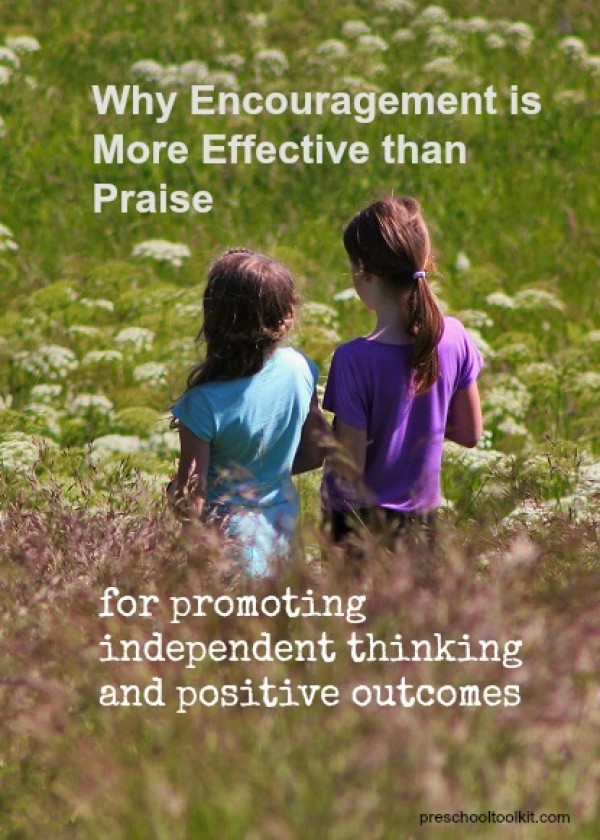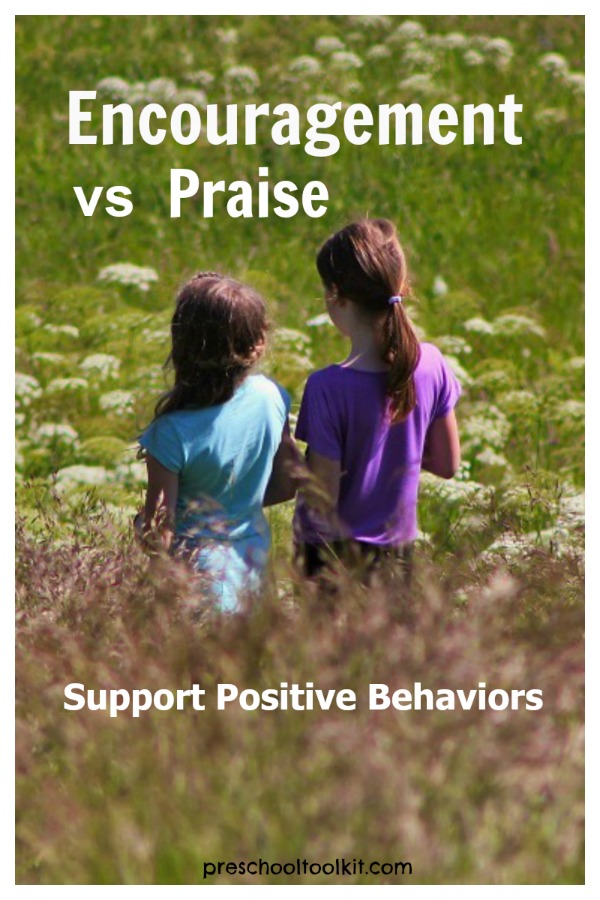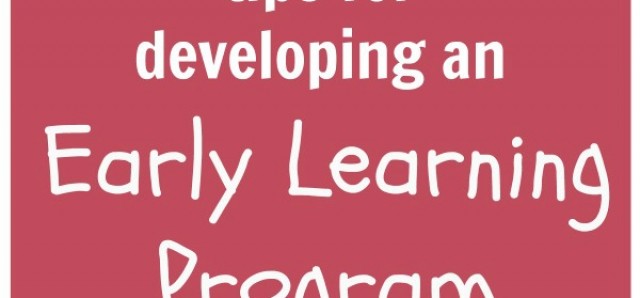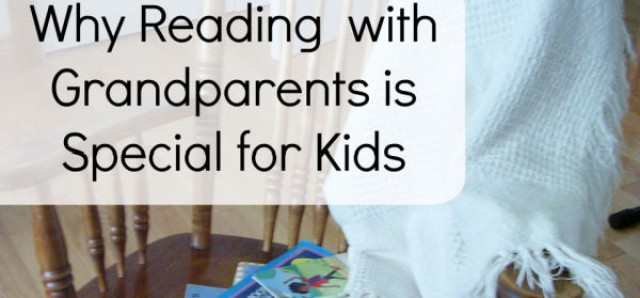Why Encouragement is More Effective than Praise
Words of encouragement reinforce efforts and accomplishments in ways that can generate independent thinking and guide future behaviors in positive ways. Use these tips to help promote positive behaviors with words of encouragement.

This post contains affiliate links. Privacy and Disclosure
While we often teach by example - how to brush teeth, how to pick up toys - the words we use can have an impact on outcomes. We use our words, along with our actions, during play times, meal times, and other events to guide, discipline, congratulate or reinforce behaviors.
Parents and care givers have opportunities to interact with young learners on a daily basis. Positive communication is valuable to parent-child and teacher-student interactions. The words we use to guide and respond to our children play an important role in generating that positive communication.
If kids are encouraged to identify problems, brainstorm solutions, and engage in meaningful dialogue, they can learn to recognize your confidence in them. This can lead to better choices that will reinforce your approval, and produce positive outcomes that will benefit everyone.
This article explores the use of words of encouragement as opposed to words of praise when interacting with children.
Words of encouragement versus words of praise
What are words of praise?
Words of praise such as ‘Good boy!’ and ‘Nice job!' are messages of reassurance. They help your child understand that he is acting in an appropriate or acceptable manner.
But the effectiveness of phrases like these is limited because the words do not focus on a specific issue or event. It will be difficult for your child to repeat a desired behavior if it is not clear what the behavior is.
Words of encouragement?
Words of encouragement, on the other hand, acknowledge your child's effort, creativity, and independence within the context of a task or event. They promote self-awareness and self-motivation by focusing on an individual's participation and contribution, rather than his ability to simply achieve or not achieve.
How to use words of encouragement
Related: A Montessori Approach to Praise / Living Montessori Now
1. Specify desired behaviors.
Set realistic goals with practical solutions. Follow up efforts and accomplishments with words specific to the completed, or anticipated, task.
If your child is helping to clean up his toys you might say:
- You worked hard picking up all the blocks. Let’s make a ramp to drive the toy cars into this box.
If you want to provide opportunities for sharing you might say:
- You did a great job picking up the crayons. Now that you are finished, it would be a big help to Davey if you washed paintbrushes with him.
Children should know exactly what you are addressing in order to benefit from praise or encouragement. If you simply ask your child to clean his room he might wonder what you mean, if it looks perfectly ok to him!
Work with your child to determine small jobs that lead to the bigger picture of having the room "cleaned up". For example, set a timer and ask your child to put as many toys in the toy box as he can before the alarm sounds, or make a game of tossing rolled up socks into the laundry hamper.
2. Make observations rather than judgments.
Show interest in the child, his ideas and opinions, regardless of the project or product. Be genuine in your speech and body language. Move near the child and make eye contact when speaking.
If you are not sure what your child has drawn you could say:
- You used so many different colors. Can you tell me about this part of your picture?
If you want to acknowledge and support work in progress you could say:
- You've been very busy cutting out leaves. Are you planning to color the tree?
- You really worked hard stacking those wooden blocks. How high do you think they are?
Comments such as “That's nice.” and “Good for you!” that we use regularly can be followed with “I haven’t seen you make those play dough shapes before.” and “You picked up all the blocks before I finished folding the laundry.”
3. Reinforce the message that what your child has done is worthwhile.
Ensure that efforts are recognized. Explain in simple language how your child assisted you or someone else with his actions. When you let him know that his contribution is valued you are reinforcing his ability to adopt positive behaviors without any tangible rewards.
If your child helps another child you can say:
- Thank you for helping Davey wash the paintbrushes. Now he will be ready when his mother comes to pick him up.
If your child spills a drink on the table you can say:
- I’m glad you helped me clean up that mess before it dripped onto the floor. Would you like to help me pour another drink?
If your child makes an attempt on his own to clean his room, acknowledge the effort with:
- I'm glad you cleared the toys from the middle of the floor so we won't trip over them at bedtime.
Build independent thinking by letting a child know that his efforts are appreciated and helpful.
4. Show confidence in your child's ability to make good choices.
Provide your child with opportunities to take ownership of routine tasks.
When your child is getting dressed you can say:
- Wow! You put your snow pants on all by yourself. Do you want to put on your jacket or boots next?
When making the transition from one activity to another you can say:
- You did a great job putting the blocks away. When your hands are washed, you will be ready for snack.
Identifying how one event leads to another promotes awareness of outcomes and the opportunity to make satisfactory choices.
5. Redirect feelings of anger or frustration into positive actions.
Sometimes a child will become upset because he assumes he has failed, based on real or imagined expectations.
Remind him of what he has already completed or even attempted. Encourage him to recognize and apply alternative actions.
Rather than dwelling on the failure of a block tower to remain standing, draw attention to the fact that there might be another way to approach the problem, and that finding a solution together can also be fun! Each attempt to think, try and retry is part of the growth process (cognitive development).
If a child’s block tower falls down repeatedly you could say:
- You reached up really high to build that tower. I see some of the blocks landed beside each other. Do you want to use them as a base for the tower this time?
If your child doesn’t finish a craft project before snack time you might say:
- Your picture is very colorful with all the red leaves you glued onto your tree. It's time to wash up for snack. Will the orange leaves fit in this box to keep them safe until tomorrow?
The words we use at home or in the classroom can be powerful tools for promoting independent thinking and positive outcomes.
Use these tools to alter or extend common words of praise to become words of encouragement. This will allow recognition of effort and achievement, and provide opportunities for guidance as well as for reinforcement of positive behaviors.

Related
Encouragement vs Praise: Does it Really Matter? / Childhood 101
Stop Praising Kids and Do This Instead / Kiddie Matters
Encouragement vs Judgement and Praise / Not Just Cute
For practical parenting and teaching solutions visit us on Pinterest:
Parenting
Teaching resources


